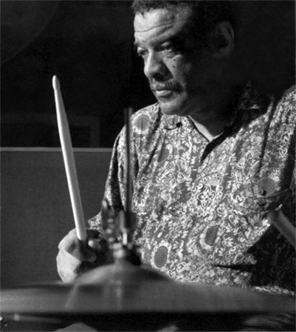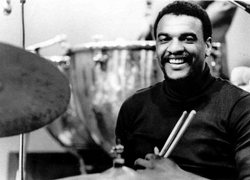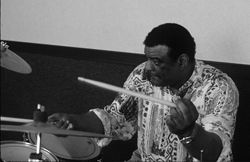Joe Chambers
Joseph Arthur Chambers was born June 25, 1942 in Stoneacre, Virginia. Chambers studied music theory at the Philadelphia Conservatory and the American University in Washington while drumming with the JFK Quintet. In 1964 he moved to New York to play with Eric Dolphy, Freddie Hubbard and Andrew Hill, doyens of the Blue Note Records label, while also attending Hall Overton’s composition classes. Chambers shone on vibist Bobby Hutcherson’s records as both drummer and composer, contributing the title tracks to Dialogue and Oblique and a masterful, side long suite to Components that pursued Hall Overton’s Third Stream inclinations between Thelonious Monk and Igor Stravinsky. Since the early 70s he has also appeared with and composed for Max Roach’s percussion ensemble M’Boom. In 1974 his “The Almoravid” was played at Carnegie Hall. In the late 90s he produced some fine contemporary work with Mulgrew Miller and Eddie Henderson. This ferociously accurate drummer is equally adept on vibraphone, with a feel both for swing and space, his compositional imagination informs every nuance of his art.
in Washington while drumming with the JFK Quintet. In 1964 he moved to New York to play with Eric Dolphy, Freddie Hubbard and Andrew Hill, doyens of the Blue Note Records label, while also attending Hall Overton’s composition classes. Chambers shone on vibist Bobby Hutcherson’s records as both drummer and composer, contributing the title tracks to Dialogue and Oblique and a masterful, side long suite to Components that pursued Hall Overton’s Third Stream inclinations between Thelonious Monk and Igor Stravinsky. Since the early 70s he has also appeared with and composed for Max Roach’s percussion ensemble M’Boom. In 1974 his “The Almoravid” was played at Carnegie Hall. In the late 90s he produced some fine contemporary work with Mulgrew Miller and Eddie Henderson. This ferociously accurate drummer is equally adept on vibraphone, with a feel both for swing and space, his compositional imagination informs every nuance of his art.
 Joe Chambers is an extremely versatile and tasteful master of all post-bop idioms. Chambers drives an ensemble with a light hand; his time is excellent and his grasp of dynamics superb. He’s not a flashy drummer by any means, but he’s a generous collaborator who makes any group of which he’s a part as good as it can possibly be. Chambers worked around Washington, D.C., in his late teens. After moving to New York in 1963, he played with Eric Dolphy, Freddie Hubbard, Jimmy Giuffre, and Andrew Hill. In the mid-’60s, Chambers played with a number of the more progressively inclined musicians associated with the Blue Note label, such as vibist Bobby Hutcherson and saxophonists Joe Henderson, Wayne Shorter, and Sam Rivers. In 1970, Chambers joined Max Roach’s percussion ensemble, M’Boom, as an original member. During the ’70s, Chambers played with a great many of jazz’s most prominent elder statesmen, including Sonny Rollins, Tommy Flanagan, Charles Mingus, and Art Farmer. With Flanagan and bassist Reggie Workman, Chambers formed the Super Jazz Trio.
Joe Chambers is an extremely versatile and tasteful master of all post-bop idioms. Chambers drives an ensemble with a light hand; his time is excellent and his grasp of dynamics superb. He’s not a flashy drummer by any means, but he’s a generous collaborator who makes any group of which he’s a part as good as it can possibly be. Chambers worked around Washington, D.C., in his late teens. After moving to New York in 1963, he played with Eric Dolphy, Freddie Hubbard, Jimmy Giuffre, and Andrew Hill. In the mid-’60s, Chambers played with a number of the more progressively inclined musicians associated with the Blue Note label, such as vibist Bobby Hutcherson and saxophonists Joe Henderson, Wayne Shorter, and Sam Rivers. In 1970, Chambers joined Max Roach’s percussion ensemble, M’Boom, as an original member. During the ’70s, Chambers played with a great many of jazz’s most prominent elder statesmen, including Sonny Rollins, Tommy Flanagan, Charles Mingus, and Art Farmer. With Flanagan and bassist Reggie Workman, Chambers formed the Super Jazz Trio.
In the late ’70s, he co-led a band with organist Larry Young. Chambers recorded with bands led by trumpeter Chet Baker and percussionist Ray Mantilla in the early ’80s. He’s maintained his association with Roach into the ’90s. Chambers has recorded infrequently as a leader; his output as a sideman, however, continues to be sizable. At age 63, Joe Chambers ranks as one of the most notable drummers and percussionists of his generation, and a staple of the venerable (and once-independent) Blue Note label. Not only have his highly imaginative compositions been covered by the likes of Freddie Hubbard and Bobby Hutcherson (with whom he’s also performed), but he has gone on to write the scores for several Spike Lee films, including She’s Gotta Have It (1986) and Mo’ Better Blues (1990). Chambers has continued to tour and record over the years, blending various rhythms and sonic textures into his music, which is not limited to just jazz. Instead he brings in inspiration from the sounds he grew up around in Philadelphia, including R&B, gospel, and rock, mixing them in with his conservatory-trained technique.
imaginative compositions been covered by the likes of Freddie Hubbard and Bobby Hutcherson (with whom he’s also performed), but he has gone on to write the scores for several Spike Lee films, including She’s Gotta Have It (1986) and Mo’ Better Blues (1990). Chambers has continued to tour and record over the years, blending various rhythms and sonic textures into his music, which is not limited to just jazz. Instead he brings in inspiration from the sounds he grew up around in Philadelphia, including R&B, gospel, and rock, mixing them in with his conservatory-trained technique.
his eclectic approach is telling on his new release, The Outlaw (Savant), in which he presents original material and new arrangements of a handful of covers (including Duke Ellington’s “In A Sentimental Mood”), stepping away from the drum kit to concentrate — for the first time in his career — on the vibraphone and other instruments. The CD cycles seamlessly through modern jazz, samba, soft, synth-laden melodies, and even Afro-Cuban sounds, revisiting the past but also keeping a keen eye on what lies ahead.

